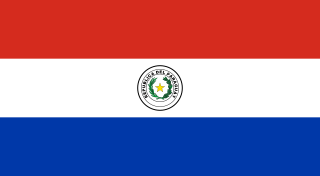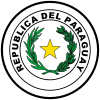Related Research Articles

Paraguay, officially the Republic of Paraguay, is a country in South America. It is bordered by Argentina to the south and southwest, Brazil to the east and northeast, and Bolivia to the northwest. Although it is one of only two landlocked countries in South America, the country has coasts, beaches and ports on the Paraguay and Paraná rivers that give exit to the Atlantic Ocean through the Paraná-Paraguay Waterway. Due to its central location in South America, it is sometimes referred to as Corazón de Sudamérica.

The police are a constituted body of persons empowered by a state, with the aim to enforce the law, to ensure the safety, health and possessions of citizens, and to prevent crime and civil disorder. Their lawful powers include arrest and the use of force legitimized by the state via the monopoly on violence. The term is most commonly associated with the police forces of a sovereign state that are authorized to exercise the police power of that state within a defined legal or territorial area of responsibility. Police forces are often defined as being separate from the military and other organizations involved in the defense of the state against foreign aggressors; however, gendarmerie are military units charged with civil policing. Police forces are usually public sector services, funded through taxes.

State police or provincial police are a type of sub-national territorial police force found in nations organized as federations, typically in North America, South Asia, and Oceania. These forces typically have jurisdiction over the relevant sub-national jurisdiction, and may cooperate in law enforcement activities with municipal or national police where either exist.
The La Direction Générale de la Sûreté Nationale is the authoritative and main State police body of Morocco. The Sûreté Nationale is tasked with upholding the law and public order. It works alongside the Gendarmerie Royale and the Forces Auxiliaires.

Law enforcement in Honduras is split among three law enforcement organisations.

As in many other countries with a French colonial heritage, law enforcement in Benin was a responsibility primarily shared by a gendarmerie and a police force. Since January 2018, the Republican Police of Benin is the unique law enforcement force.
Like many other countries with a French colonial heritage, law enforcement in Burkina Faso is a responsibility primarily shared by the gendarmerie and the police.

The Gendarmerie Nationale and the Police Nationale are the national police forces of Chad.
The law enforcement agencies of Madagascar include:
Responsibility for law enforcement in Togo is primarily shared by the Police nationale, the civilian national police, and the paramilitary Gendarmerie nationale togolaise.
Guatemalan law enforcement, mainly performed by the civilian-led Policia Nacional Civil (PNC), yet assisted by its military, which has a poor record with regard to human rights violations. During President general Otto Pérez Molina, elected in 2012, stepped up the use of military reinforcement in the country's law enforcement, which was introduced on 2005 as a 'temporary measure' yet lasted several electoral periods. During the country's civil war from 1960 to 1996, 200,000 people were killed and 45,000 forcibly disappeared.
Law enforcement in Nicaragua falls under the jurisdiction of La Policia Nacional of Nicaragua. They are in charge of regular police functions and sometimes work in conjunction with the Nicaraguan military, making it an indirect and rather subtle version of a gendarmerie.
Rwanda's legal system is largely based on German and Belgian civil law systems and customary law.

Law enforcement in the Democratic Republic of the Congo has historically been focused on furthering the state's aims with no regard for human rights. The Police nationale congolaise is the police throughout the territory of the Democratic Republic of the Congo. It was composed of between 110,000 – 150,000 officers as of 2010.
The law enforcement in the Republic of the Congo is monitored by two organisations Congolese national gendarmerie and the Congolese national police.

Airport police units are a security police agency assigned to perform law enforcement functions at airports. They provide a wide range of law enforcement duties and responsibilities including patrol, investigation, traffic flow management, and control and response to airport emergencies. Airport police provide enhanced safety to airport employees, and to passengers. Officers can be found at security gates, throughout the terminal area, and around the airport’s perimeter.

The following outline is provided as an overview of and topical guide to South America.
A law enforcement agency (LEA), in North American English, is any government agency responsible for the enforcement of the laws.

The National Police of Paraguay is the main law-enforcement agency in Paraguay, operating under the auspices of the Ministry of Internal Affairs. It is responsible for ensuring the internal security of the nation.
